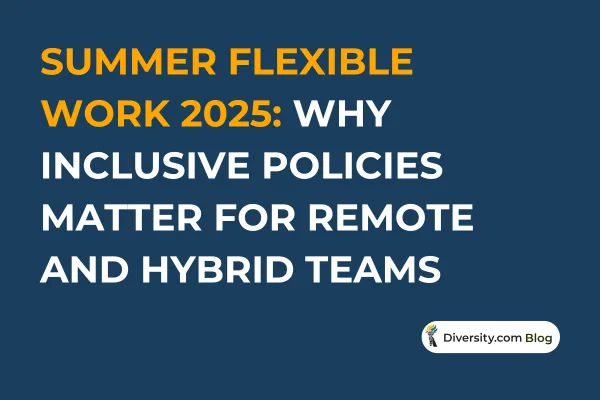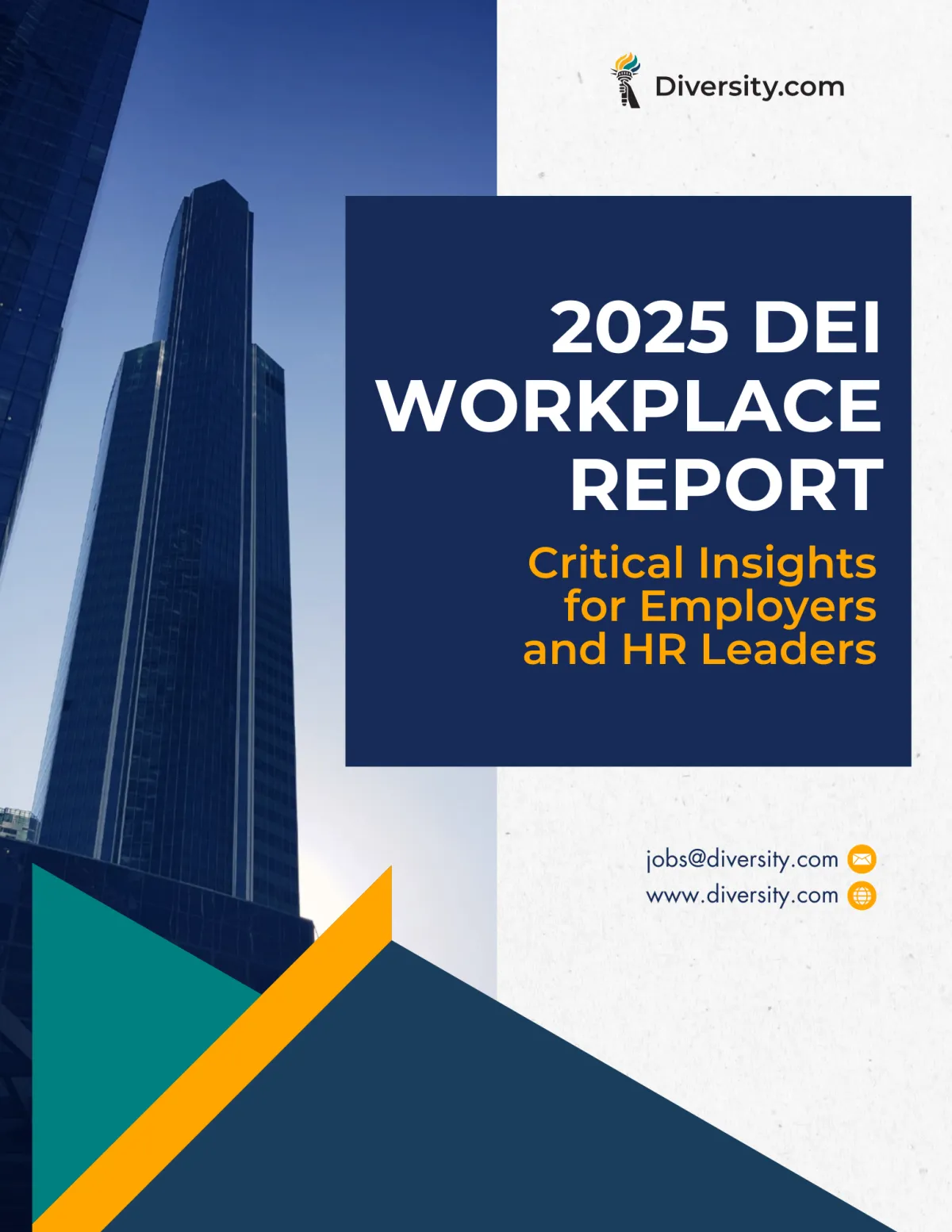
Summer Flexible Work 2025: Why Inclusive Policies Matter for Remote and Hybrid Teams
When Flexibility Isn’t Just a Perk
When temperatures rise, so do requests for remote work, flexible hours, and compressed workweeks. Summer is the season when many companies offer “summer Fridays” or adjust hours to meet employee needs.
But let’s be honest: true flexibility is more than a seasonal benefit.
It’s a litmus test for whether your organization actually understands the barriers facing parents, caregivers, and marginalized workers—especially in 2025, as the conversation around remote work shifts from pandemic necessity to a question of equity.
What the Research Shows
Parents and caregivers: Flexible schedules are the #1 factor influencing working parents’ job satisfaction and retention. In a 2024 Future Forum study, 81% of working parents ranked flexibility as “extremely important” for staying with their employer (Future Forum, 2024).
Marginalized employees: Remote work and flexible hours especially benefit women, employees of color, and people with disabilities—groups who often face microaggressions, commute barriers, or lack of support in traditional office settings (McKinsey & Company, 2023; Harvard Business Review, 2023).
Company impact: Teams with flexible work policies report higher engagement, lower turnover, and stronger inclusion metrics across all demographics (SHRM, 2024).
How Flexible Work Drives Real DEI Outcomes
1. Reduces the “Flexibility Gap”
Not everyone experiences work the same way.
Parents with unpredictable childcare needs, caregivers juggling eldercare, or disabled employees who find commuting draining all benefit when flexibility is truly available—not just in policy, but in practice.
2. Boosts Retention for Marginalized Groups
Studies show women and employees of color are more likely to stay with an employer offering remote or hybrid work (McKinsey & Company, 2023). Summer flexibility is often the “trial run” for broader change.
3. Levels the Playing Field
Commuting, office attire, and rigid hours may seem “neutral,” but they hit lower-income employees and those with invisible disabilities hardest. Flexible policies reduce these unspoken barriers.
4. Fosters Psychological Safety
Remote work can reduce exposure to microaggressions and provide a safer space for employees to do their best work (Harvard Business Review, 2023).
5. Signals Trust and Modern Leadership
Flexible summer hours and genuine trust in employee autonomy send a clear message: performance is measured by outcomes, not “butts in seats.”
Best Practices for Inclusive Summer Flexibility
Make policies explicit: Don’t assume managers know what’s allowed. Write and communicate summer flexibility options—remote days, flexible hours, compressed workweeks—clearly.
Ensure equity: Audit who’s using flexibility, and who feels left out. Provide technology, resources, and support so all employees—not just a favored few—can participate.
Ask for feedback: Listen to parents, caregivers, and ERGs about what flexibility actually means for them.
Set boundaries, not micromanagement: Trust employees to manage their time, and focus on results. Avoid “always-on” expectations that turn flexibility into extra work.
Conclusion
Summer is the perfect time to lead by example. Inclusive flexible work isn’t just nice to have—it’s a must for building workplaces that reflect the real lives of your employees.
The future belongs to organizations that recognize flexibility as a key driver of equity, retention, and belonging.
How Diversity.com Supports Inclusive Workplaces and Diverse Talent
At Diversity.com, we know workplace diversity and equity are essential for lasting success.
Whether you are building inclusive hiring practices, seeking employers who value diversity, or navigating changes in workplace legislation, our DEI job board is your trusted partner for opportunity and progress.
As a leading job board for diversity and inclusion, we connect employers committed to equitable workplaces with job seekers looking for inclusive employers and safe, supportive work environments.
For Employers & HR Leaders:
✔ Post Inclusive Job Listings — Reach a broad and diverse talent pool, attract candidates who value workplace equity, and demonstrate your commitment to building a truly inclusive company culture.
✔ Access Up-to-Date DEI Resources — Stay current with the latest guidance on diversity hiring, workplace inclusion policies, and strategies to create equitable workplaces.
✔ Build a Resilient Community — Join a community of HR leaders focused on advancing diversity, equity, and inclusion, and share effective strategies for workplace transformation.
For Job Seekers:
✔ Find Inclusive and Equitable Employers — Discover organizations that lead with DEI, support workplace diversity, and are recognized for inclusive hiring.
✔ Strengthen Your Profile — Build your job seeker profile and connect with employers who value your skills, experiences, and authentic self.
✔ Empower Your Job Search — Access up-to-date articles, guides, and resources to help you find safe, inclusive jobs and advance your career in diverse workplaces.
Every job search and every new hire is a step toward more equitable, inclusive workplaces.
Ready to find your next opportunity or post your inclusive job opening?
If you have any questions or need assistance, feel free to Contact Us Here. Our dedicated support team is ready to help!
Related Articles
Debunking the Myth: DEI Doesn’t Mean Lowering Hiring Standards
Supporting Employee Mental Health During PTSD Awareness Month: Building a Trauma-Informed Workplace
Summer Internship Season: Best Practices for Diversity and Inclusion in Internship Programs
Men’s Health Month at Work: Breaking Barriers and Supporting Men’s Well-Being in the Workplace
Real Inclusion Isn’t Seasonal: How to Support LGBTQ+ Employees All Year
Sources & References
Future Forum. (2024). Future of work: Flexible work and inclusion survey. https://futureforum.com/research/
Harvard Business Review. (2023). Remote work and inclusion: Making hybrid work for everyone. https://hbr.org/2023/07/remote-work-inclusion
McKinsey & Company. (2023). Diversity matters even more: How hybrid work helps. https://www.mckinsey.com/featured-insights/diversity-and-inclusion
Society for Human Resource Management. (2024). Workplace flexibility and inclusion. https://www.shrm.org/hr-today/news/hr-news/pages/summer-flexibility-and-diversity.aspx

